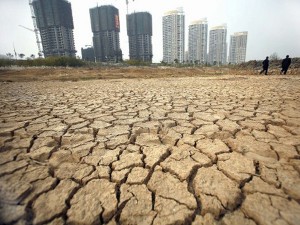As one of the countries most vulnerable to global warming, the Philippines must speak with the loudest voice in demanding reparations from developed nations that contribute most to climate change, according to an activist group.
The Philippines, according to Freedom from Debt Coalition (FDC), “should be the noisiest” because it is a “frontline country” whose exposure to extreme weather events wrought by climate change is inversely proportional to its share of greenhouse gas emissions.
‘Climate justice’
This is the idea behind the concept called “climate justice,” which seeks to award damages to nations that contribute the least to global warming but are receiving the brunt of its effects, FDC vice president Lidy Nacpil said at a briefing for reporters at the Department of Environment and Natural Resources (DENR) on Tuesday.
Several studies have cited the Philippines as one of the most heavily affected by disasters due to its location in the Pacific Ring of Fire and the poor socioeconomic conditions in coastal communities in the country, Nacpil said.
She said many developed countries were now trying to escape from commitments they made in the past to mitigate climate change and to help developing countries adapt to it.
“In the last few years, developed countries have been trying to get away from their responsibility. They now make proposals like burden sharing, or coproducing climate finance, or putting in money in climate finance in the form of loans,” Nacpil said.
But even the government, through the Climate Change Commission, believes funds given by developed countries for climate adaptation measures should not be in the form of loans because “it’s a debt that should be paid by the developed countries” for their carbon emissions, she said.
Adaptation, mitigation
Climate change funds go either to adaptation, which focuses on making communities resilient to the impacts of climate change, or mitigation, which concentrates on reducing greenhouse gas emissions.
Experts believe developing countries like the Philippines should direct their efforts more toward adaptation than mitigation because they have only minimal contributions to greenhouse gases that cause global warming, while mitigation efforts should be made by the countries who emit the most greenhouse gases.
Nacpil, however, said most of the climate funds the Philippines is getting is for mitigation for a number of reasons, especially, the fact that the donor can secure financial incentives or “carbon credits” for the project.
Leverage
Theoretically, she added, developing countries like the Philippines already have the numbers to demand more climate change reparations from the United States and European Union countries.
“But the reason they fold is that developed countries have a lot of leverage. They can withhold money,” Nacpil said.
Nacpil said, however, that she took it as a good sign that there was more representation from the Asia-Pacific region in the Green Climate Fund (GCF), which was conceptualized to become the central agency to manage funds related to climate change mitigation and adaptation.
The Asia-Pacific region is represented by China, India and Indonesia, with Indonesia having the Philippines as alternate.
Nacpil said the Philippines and Indonesia informally agreed to share the term, with each country holding the seat for one and a half years.
